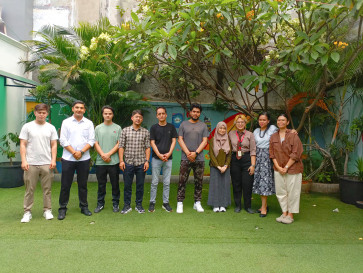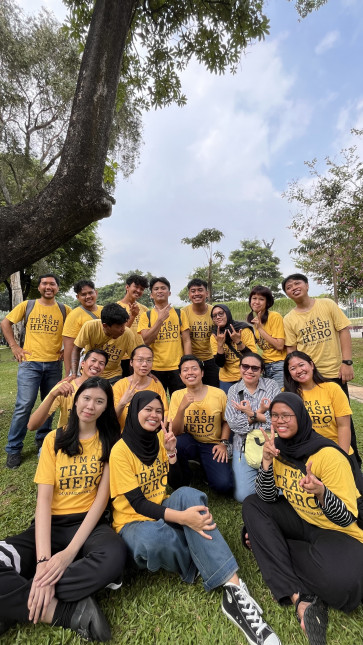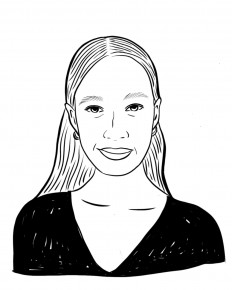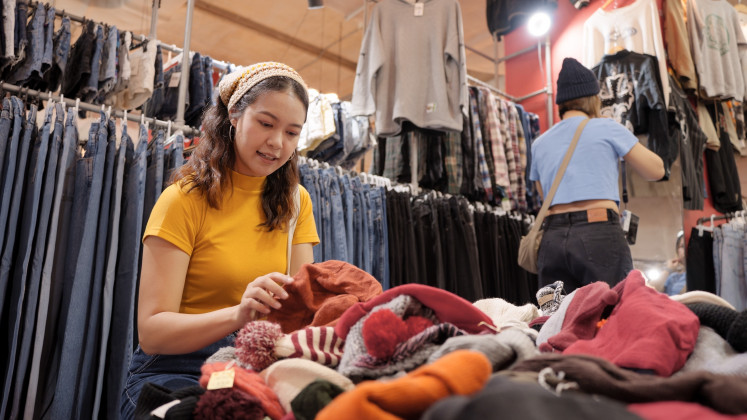“Not even one kid?” my cousin asked. “Don’t you worry about never really knowing what life’s all about?”
We were in my favorite pet shop, surrounded by shelves of cat toys and treats and rows of brightly colored vitamin bottles.
I grabbed a supplement recommended by the vet to boost my 3-year-old cat Ninu’s immune system before her yearly vaccination. The price tag? Rp 260,000.
“You think I’m missing out because I’m not sleep-deprived and covered in spit-up?” I replied.
“Fair point,” she laughed, tossing the bottle into our basket, and we moved on to the catnip aisle.
Pawrenting over parenting

Thank you!
For signing up to our newsletter.
Please check your email for your newsletter subscription.
I wish everybody could be as relaxed as my cousin about my life choices. In a country where family and tradition reign supreme, choosing to be a child-free pawrent is understandable still controversial, but the fact is that this choice is something increasingly being made by thousands around the world.
South Korea made headlines last December after its largest online marketplace reported that it had sold more strollers that year for pets than for babies. In China, as the fertility rate declined, pet ownership increased rapidly, according to Antrozoös, a journal that studies the relationships between people and animals.
Millennials in the US, Japan and Mexico are also moving away from traditional family structures and opting to have dogs as their companions, according to a recent article on Business Insider.
Even in Indonesia, the choice is gaining traction.
According to the 2022 National Socioeconomic Survey by Indonesia’s Central Bureau of Statistics (BPS), 8% of women of reproductive age—around 71,000 individuals—have chosen to remain child-free. This number has been steadily increasing, signaling a trend toward child-free lifestyles in Indonesia — a pattern that BPS expects to continue next year.
At the same time, the 2024 TGM Global Pet Care Report shows that pet ownership in Indonesia surpasses the Asia-Pacific average across all age groups, with the highest rate of 79% among those aged 35-44.
Euromaster International also reports a staggering 129% growth in Indonesia’s pet ownership from 2017 to 2021, further solidifying this furry phenomenon.
The path to pawrenthood
So, why do we choose pawrenting over parenting?
In many ways, pawrenthood is filled with the same sacrifices and joys as traditional parenthood—just in a smaller, fluffier and more affordable package.
The BPS survey revealed that economic challenges stand out as the primary factor for families to choose a child-free lifestyle.
Rina, 27, and her husband chose to focus on financial stability for a secure and comfortable future together.
“We’re still building our lives and careers, and honestly, we prioritized ourselves first,” Rina explains.
“Marriage, for us, is about companionship, not just following the traditional path of starting a family. Our cat gives us a sense of responsibility and nurturing without the astronomical costs of raising a child.”
The couple’s perspective isn’t surprising considering today’s economy. The 2022 Cost of Living Survey showed that monthly household expenses already averaged around Rp14.88 million in Jakarta, where the minimum wage is only about Rp 5 million. At this rate, even dual-income couples would struggle to just survive.
For others, the decision to embrace a child-free lifestyle is a product of circumstance. For millennial couple Leah and Martin, the journey began after unsuccessful rounds of IVF.
Marriage, for us, is about companionship, not just following the traditional path of starting a family. -RINA
“After our second failed IVF, I took a break from trying to get pregnant. Then, the pandemic happened—we got dogs, and everything changed,” shares Leah, 43, a pawrent to two dogs.
“By the time the world reopened, I was over 40 and realized I already happy as a pawrent and wasn’t keen on getting pregnant at this age anymore.”
Leah also cites multiple factors behind their decision: “The idea of working until 65 or more just to pay for college isn’t appealing, and honestly, the state of the world today isn’t one I’d want to be born into.”
And finally, some people just don’t want kids, plain and simple, and they shouldn’t need to explain themselves. Having a child isn’t an obligation but a decision they’ve consciously chosen to forgo.
Beyond playtime and snuggles
Some criticize those who choose the child-free lifestyle as selfish, but as a 28-year-old with three cats, let me clarify: For us who’ve gone the fur-covered route, the need to nurture and care doesn’t go away. It just looks a little different.
To the uninitiated, pawrenting may seem as simple as topping off a food bowl or posting cute pet photos on Instagram. It’s definitely not as difficult as raising a tiny human, but anyone in the trenches of pet parenthood knows it entails a serious commitment.
Take Lidya, 37, a tattoo artist based in Bali, who spends around Rp 30 million a year on her three dogs. Her two Miniature Pinschers and a Kintamani-Bali dog receive nothing but the best care, from organic homemade meals to five-star boarding services when she’s away for work.
“Spending a large sum isn’t an afterthought. To me, it’s a financial commitment that reflects my love and responsibility,” she says.
In the same vein, Drh. Siti Zaenab, a veterinarian and owner of My Vets, a well-known pet clinic in Kemang and BSD, often sees pet parents going the extra mile to ensure their pets are well-socialized.
“Pet parents are realizing that puppy classes are both beneficial and essential,” she explains.
“When a dog is properly educated and trained, it’s amazing how deeply they connect with their family,” she adds.
For some pawrents, the commitment to their pets even leads them to make significant life changes.
When Fiera, 42, found one of her dogs had developed a respiratory condition, she made a life-changing decision.
“My job offered remote working options, so I looked for a house in a mountain area with better air quality—not just for my pets but for me as well,” she says.
The move required coordinating veterinary care and preparing for emergencies in a less-equipped rural setting. For her, this careful planning mirrors unconditional love.
“When you act from the heart, that kindness is returned in the simplest ways—just a desire to survive and thrive. It’s basic, but it’s pure,” she reflects.
For pawrents, pets—just like kids—are family. Even though we know they’re not the same, we roll our eyes when the inevitable question comes up: But who will take care of you when you’re old?
We know well enough that pets won’t be here to nurse us in old age or help us navigate our twilight years. We don’t expect anything in return from our pets, and in that sense, maybe pawrenting is a selfless choice.
Allestisan Derosa is a writer who often turns personal challenges into stories. She finds comfort working at local pet shops and has a knack for making any space feel like home.























